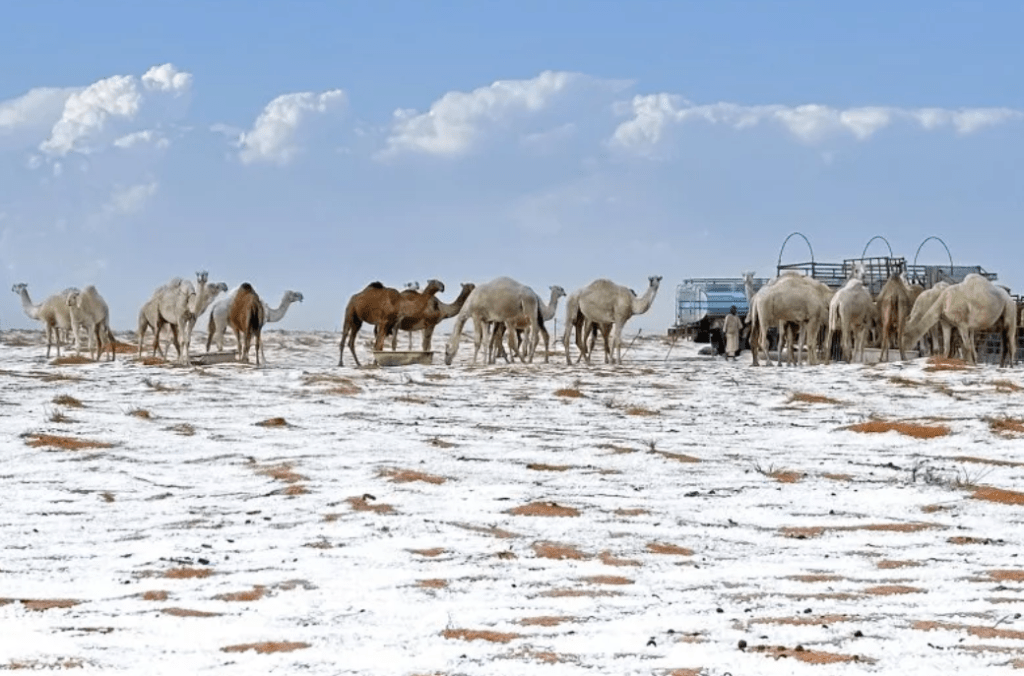The recent rare snowfall in Saudi Arabia’s Al-Jawf desert has left locals astonished and raised critical questions about the future of the region’s climate. This unexpected event, occurring just days before the COP29 summit in Baku, underscores the urgency for climate action in the MENA region.
As global temperatures rise, such anomalies may become more frequent, highlighting the need for robust environmental strategies. This article will explore these rare weather events, their implications for global warming, and how MENA countries are responding with ecological initiatives.
Snowfall in the Sahara Desert, Algeria
In January 2022, the Sahara Desert experienced an extraordinary snowfall, an event that has happened only about four times in the same area over the past four decades. The town of Ain Sefra in Algeria saw its sand dunes blanketed in white, creating a striking contrast against the orange sand.
This event was particularly notable because the Sahara is one of the hottest and driest places on Earth, making snowfall extremely rare.
Hailstorms & Heavy Rain in the UAE
The UAE has experienced a few rare weather events over the past years, though exact counts can be challenging to pinpoint due to varying reporting standards and the sporadic nature of such occurrences. Notably, hailstorms were recorded in the UAE in years such as 2013, 2016, 2020, and 2024.
These severe hailstorms and heavy rains particularly impacted the northern emirates, causing significant damage to property and infrastructure. Hailstorms are uncommon in the UAE, a country known for its arid climate.
Flooding in Saudi Arabia
In recent years, Saudi Arabia has faced severe flooding in several regions, notably in 2009, 2011, and 2022. These incidents highlighted the vulnerability of affected cities to heavy rainfall and underscored the need for improved flood management due to persistent issues with inadequate drainage systems.
For instance, during the 2009 Jeddah floods, the city received 70 mm of rainfall in just a few hours, leading to severe flooding that resulted in 113 deaths and caused extensive damage to infrastructure.
The Significance of COP29
The COP29 summit in Baku, Azerbaijan, from Nov. 11-22, 2024, brings nearly 200 countries together to address climate finance and emission reduction plans. Key discussions include establishing a global fund for climate adaptation and mitigation, with a focus on MENA countries vulnerable to climate change.
The European Centre for Development Policy Management has raised concerns about heat and drought in MENA, urging cross-border cooperation. MENA nations are showcasing renewable energy projects and commitments to reduce emissions. Water scarcity in the region is also a significant topic, with a focus on sustainable management practices.
MENA Environmental Commitments
In response to these climate challenges, several MENA countries have announced ambitious environmental goals and partnerships.
For example, Saudi Arabia’s Vision 2030 includes significant investments in renewable energy and aims to reduce carbon emissions by 50% by 2030. The UAE has launched the “Net Zero by 2050” initiative, committing to achieving net-zero emissions within the next three decades.
These initiatives are crucial for mitigating the effects of climate change and ensuring a sustainable future for the region.
The rare climate events observed in the MENA region, from Sahara snowfall to hailstorms in the UAE, highlight the growing unpredictability of weather due to global warming.
These shifts in weather patterns point to broader changes in global climate dynamics, urging better infrastructure and disaster response strategies. For key insights and infographics on climate trends and risks in the MENA region, refer to the latest report by the MET Office.
We Also Said: Don’t Miss It…Middle East Tourism Booms: Visitor Numbers Double in Just Five Years



